初一英语下册情态动词2
七年级英语下册必考语法:情态动词

七年级英语下册必考语法:情态动词情态动词(Modal verbs)本身有一定的词义,表示语气的单词。
但是不能独立作谓语,只能和动词原形一起构成谓语。
情态动词用在行为动词前,表示说话人对这一动作或状态的看法或主观设想。
情态动词虽然数量不多,但用途广泛,主要有下列:can (could), may (might), must, need, ought to, dare (dared), shall (should), will (would)。
因为情态动词带有某种的情绪性,比如dare就很强硬,比较负面,而may就比较的和善,为了避免在谈话时把“讨论”变成“攻击”,宝贝们一定要学会善用情态动词哦!分类情态动词有四类:①只做情态动词:must,can(could),may(might),ought to②可做情态动词又可做实义动词:need,dare③可做情态动词又可做助动词:shall(should),will(would)④具有情态动词特征:have(had) to,used to位置情态动词在句中放在谓语动词之前, 谓语动词前若有助动词,则在助动词之前,疑问句中,情态动词则在主语之前。
I can see you. Come here.我能看见你,过来吧。
He must have been away.他一定走了。
What can I do for you?我能帮你吗?How dare you treat us like that!你怎能那样对待我们!情态动词无人称和数的变化, 情态动词后面跟的动词需用原形,否定式构成是在情态动词后面加"not"。
个别情态动词有现在式和过去式两种形式, 过去式用来表达更加客气, 委婉的语气, 时态性不强, 可用于过去,现在或将来。
情态动词属非及物动词,故没有被动语态。
情态动词没有非谓语形式,即没有不定式,分词,等形式。
He could be here soon.他很快就来。
初中英语情态动词的用法归纳
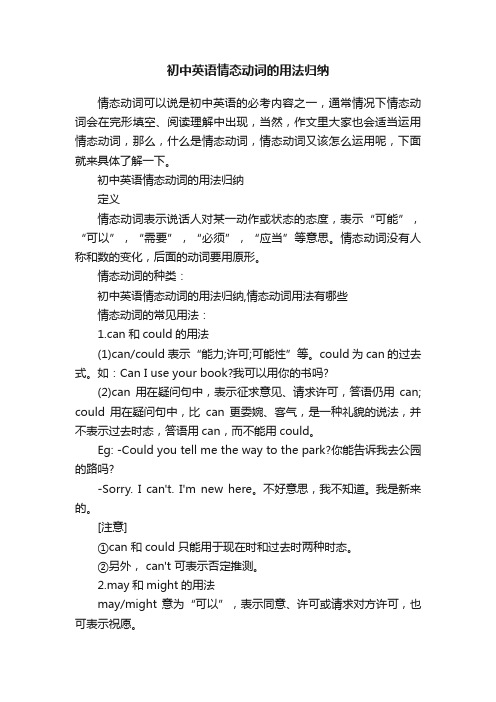
初中英语情态动词的用法归纳情态动词可以说是初中英语的必考内容之一,通常情况下情态动词会在完形填空、阅读理解中出现,当然,作文里大家也会适当运用情态动词,那么,什么是情态动词,情态动词又该怎么运用呢,下面就来具体了解一下。
初中英语情态动词的用法归纳定义情态动词表示说话人对某一动作或状态的态度,表示“可能”,“可以”,“需要”,“必须”,“应当”等意思。
情态动词没有人称和数的变化,后面的动词要用原形。
情态动词的种类:初中英语情态动词的用法归纳,情态动词用法有哪些情态动词的常见用法:1.can和could的用法(1)can/could 表示“能力;许可;可能性”等。
could 为 can 的过去式。
如:Can I use your book?我可以用你的书吗?(2)can 用在疑问句中,表示征求意见、请求许可,答语仍用can; could 用在疑问句中,比can 更委婉、客气,是一种礼貌的说法,并不表示过去时态,答语用can,而不能用could。
Eg: -Could you tell me the way to the park?你能告诉我去公园的路吗?-Sorry. I can't. I'm new here。
不好意思,我不知道。
我是新来的。
[注意]①can 和could 只能用于现在时和过去时两种时态。
②另外, can't 可表示否定推测。
2.may和might的用法may/might 意为“可以”,表示同意、许可或请求对方许可,也可表示祝愿。
might 是may 的过去式,有两种用法:一种表示过去式;一种表示虚拟语气,使语气更加委婉、客气,或表示可能性更小。
以may开头的一般疑问句,其否定回答用mustn't。
Eg: MayI use your book? 我可以用你用的书吗?He might be alive. 他可能还活着。
【注意】can和may都可以用来表示请求或允许,但may比can更正式,更客气。
初中英语中的情态动词用法解析

初中英语中的情态动词用法解析情态动词是英语中一个非常重要的语法现象,它们在句子中起到了承上启下的作用。
在初中英语学习中,我们经常会遇到情态动词的使用,但是很多学生对其用法还存在一些困惑。
本文将详细解析初中英语中的情态动词用法,帮助大家更好地理解和运用。
一、情态动词的定义和特点情态动词是一类特殊的助动词,用来表示说话人对某种行为或状态的态度、意愿、推测、能力等。
常见的情态动词包括can、could、may、might、must、shall、should、will、would等。
情态动词具有以下特点:1. 情态动词没有人称和数的变化,即主语是什么,情态动词就是什么形式。
2. 情态动词后面直接跟动词原形,不加to。
3. 情态动词本身没有时态,它们通过上下文来表示不同的时态。
4. 情态动词后面的动词要用原形,不能加-ing。
二、情态动词的用法1. 表示能力和可能性情态动词can表示能力,表示某人有能力做某事。
例如:I can swim.(我会游泳。
)情态动词may表示可能性,表示某事有可能发生。
例如:It may rain tomorrow.(明天可能会下雨。
)2. 表示许可和禁止情态动词can表示许可,表示某人允许做某事。
例如:Can I go to the park?(我可以去公园吗?)情态动词must表示禁止,表示某人不允许做某事。
例如:You must not smoke here.(你不能在这里吸烟。
)3. 表示推测和猜测情态动词may和might表示推测,表示某事可能发生或某人可能做某事。
例如:He may be busy.(他可能很忙。
)情态动词must表示肯定的推测,表示某事几乎可以肯定。
例如:She must be tired.(她一定很累。
)4. 表示义务和建议情态动词must表示义务,表示某人有责任做某事。
例如:You must finish your homework.(你必须完成作业。
初一同步辅导unit 6 electricity-英语下册Unit6 reading词汇、2B情态动词用法、2B完形填空专题

初一同步辅导第12周英语Spep 1: 导入(引出本单元的话题)Step 2: 同步题型分析1. Key Words1. anyone pron. 任何人【用法】anyone 常用于否定句或疑问句中,代替someone。
anyone=anybody如:There isn’t anyone in the room.Does anyone else want to come?【拓展】some,any和body,one,thing构成合成代词somebody,someone,something,anybody,anyone,anything等和some,any的基本用法一样,由some构成的合成代词一般用于肯定句,由any构成的合成代词一般用于否定句和疑问句。
如果要在疑问句中表示请求,建议等肯定的意思或者盼望得到肯定的答复,须用somebody,someone或something。
注意: anyone 用于肯定句中,表示“随便哪个人;无论谁”【例句】-Would like__ to help you with your homework?-You are so thoughtful. __is OK.I am afraid I cannot finish the work without other's help.A.someone, someone B. someone, anyoneC. anyone, anyoneD. anyone, someoneKeys: B2. reply v. 回答n. 答复【用法】She only replied with a smile.【拓展】reply 与answer(1) answer 可做及物或不及物动词;reply除后接that 从句或引出直接引语时作及物动词,一般只用作不及物动词。
reply to my questions ==answer my questions.1如:He replied that he had changed his mind.He didn’t reply to/answer my question.(2) answer 除表示“回答”外,还可表示接听(电话)或对门铃等声响作出反应等。
外研版七年级英语下册Module2Whatcanyoudo语法篇试题

Module 2 语法篇______________________________________________________________________________ ______________________________________________________________________________掌握情态动词can的用法情态动词的特征:(1)有一定的词义但不能单独作谓语,必须和行为动词或系动词连用,构成谓语。
(2)无人称和数的变化(have to例外,其第三人称单数形式为has to)。
如:We must stay here.(3)后接动词原形,即不带to的不定式。
如|:He may lose her way.(4)具有助动词的作用,可用来构成否定句、疑问句及用于简明答语。
如:--Can you sing an English song?--Yes,I can.情态动词can 的用法:情态动词can 后面跟动词原形。
它可以表示能力,译为“能,会”;可以表示怀疑、推测,译为“可能”;表示请求、允许,译为“可以”。
本单元主语集中讲述can 的肯定、否定和疑问形式。
1.表示能力,译为“能,会”。
如:Can you play basketball?2.表示怀疑、推测,译为“可能”,常用于否定句和疑问句中。
如:Lucy can’t be in the room.3.表示请求、允许,译为“可以”,相当于may。
如:You can go now.含有情态动词can 的肯定句变否定句时,直接在它后面加not;肯定句变一般疑问句时,把can提前即可。
见下表:如:My sister can sing.My sister can’t sing.--Can your sister sing?--Yes ,she can.--No ,she can’t.单项选择:1.--What can you do?--I __________ play tennis.A.canB.mayC.mustD.have to答案:A解析:can 表示能力。
情态动词用法总结归纳
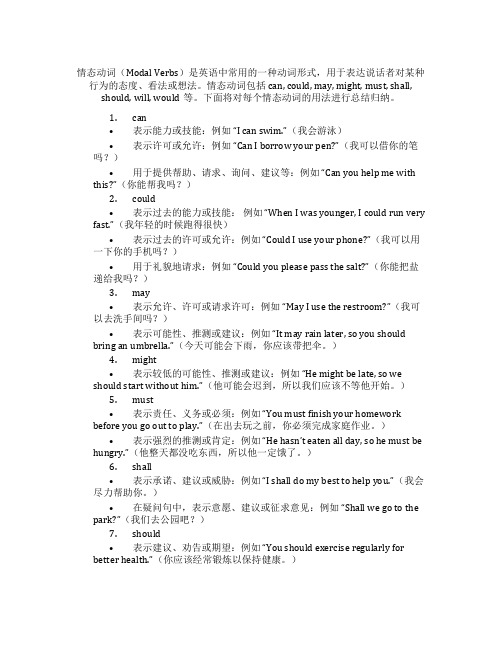
情态动词(Modal Verbs)是英语中常用的一种动词形式,用于表达说话者对某种行为的态度、看法或想法。
情态动词包括can, could, may, might, must, shall, should, will, would等。
下面将对每个情态动词的用法进行总结归纳。
1.can•表示能力或技能:例如“I can swim.”(我会游泳)•表示许可或允许:例如“Can I borrow your pen?”(我可以借你的笔吗?)•用于提供帮助、请求、询问、建议等:例如“Can you help me with this?”(你能帮我吗?)2.could•表示过去的能力或技能:例如“When I was younger, I could run very fast.”(我年轻的时候跑得很快)•表示过去的许可或允许:例如“Could I use your phone?”(我可以用一下你的手机吗?)•用于礼貌地请求:例如“Could you please pass the salt?”(你能把盐递给我吗?)3.may•表示允许、许可或请求许可:例如“May I use the restroom?”(我可以去洗手间吗?)•表示可能性、推测或建议:例如“It may rain later, so you should bring an umbrella.”(今天可能会下雨,你应该带把伞。
)4.might•表示较低的可能性、推测或建议:例如“He might be late, so we should start without him.”(他可能会迟到,所以我们应该不等他开始。
)5.must•表示责任、义务或必须:例如“You must finish your homewor k before you go out to play.”(在出去玩之前,你必须完成家庭作业。
)•表示强烈的推测或肯定:例如“He hasn’t eaten all day, so he must be hungry.”(他整天都没吃东西,所以他一定饿了。
人教版英语七年级下册情态动词

情态动词【概念引入】1)情态动词表示说话人对所做动作的观点或态度。
如:需要、可能、意愿、怀疑等。
例如:I must go now. 我现在必须得走了。
2)情态动词一般没有人称和数的变化,但是个别情态动词有时态的变化。
例如:can的过去式是could。
3)情态动词不能单独作谓语,后接动词原形共同做谓语。
例如:I can swim. 我会游泳。
4)常见的情态动词有:can, may, must, have to, should, would等。
5)情态动词一般不止一个意思,它的否定式是在情态动词的后面加not,一般疑问句是将情态动词提到句首。
例如:I can’t speak French. 我不会说法语。
Can you speak English?你会说英语吗?【用法讲解】1.can的用法。
1)表能力We can do our homework by ourselves. 我们可以自己完成作业。
He can swim well. 他游泳很好。
I can play football but I can’t play the piano. 我会踢足球但是我不会弹钢琴。
2)表许可You can watch TV after supper. 晚饭后你可以看电视。
You can’t play basketball in the street. 你不能在街上打篮球。
3)表请求Can you help me with my math? 你能帮我学数学吗?Could you lend your book to me? 你能把你的书借给我吗?注意:could 是can的过去式,但是这里并不表示过去时,而是表示委婉语气。
拓展:can 和be able to的区别(1)情态动词can只有两种时态形式,现在式can和过去式could,而be able to有多种时态形式。
在一般过去时中都表示能够时,两者可以互换。
例如:Mary can play the piano. (一般现在时)玛丽会弹钢琴。
初中情态动词用法总结

初中情态动词用法总结情态动词是用来表达说话人的态度、情感和推测等的特殊动词。
情态动词包括can、could、may、might、must、shall、should、will、would、ought to等。
以下是初中情态动词的用法总结:1. Can和Could:- 表示能力、技能、许可或请求的可能性:I can swim.(我会游泳。
)Could you open the door for me, please?(请你开门好吗?)- 表示可能性或推测:It can't be true.(那不可能是真的。
)Could he be the one who took my book?(他可能是拿走了我的书的那一个人吗?)2. May和Might:- 表示许可、请求或可能性:May I use your pen?(我可以用你的笔吗?)She might be late.(她可能会迟到。
)- 表示祝愿或警告:May you have a happy birthday!(祝你生日快乐!)You may get hurt if you do that.(你这样做可能会受伤。
)3. Must:- 表示推测或肯定:It must be raining outside.(外面肯定在下雨。
)- 表示义务或责任:You must finish your homework before going out to play.(出去玩之前你必须完成作业。
)4. Shall和Should:- 表示提议、请求、建议或义务:Shall we go to the park together?(我们一起去公园好吗?)You should study harder for the test.(你应该更努力地学习应考试。
)5. Will和Would:- 表示将来的意愿、决心或意志:I will help you with your project.(我会帮助你完成你的项目。
专题 05 情态动词 2020-2021学年七年级英语下学期期末专项复习(外研版)
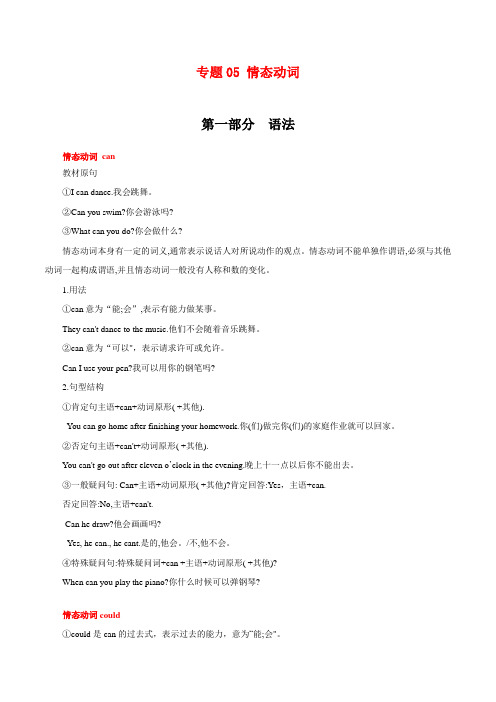
专题05 情态动词第一部分语法情态动词can教材原句①I can dance.我会跳舞。
②Can you swim?你会游泳吗?③What can you do?你会做什么?情态动词本身有一定的词义,通常表示说话人对所说动作的观点。
情态动词不能单独作谓语,必须与其他动词一起构成谓语,并且情态动词一般没有人称和数的变化。
1.用法①can意为“能;会”,表示有能力做某事。
They can't dance to the music.他们不会随着音乐跳舞。
②can意为“可以",表示请求许可或允许。
Can I use your pen?我可以用你的钢笔吗?2.句型结构①肯定句主语+can+动词原形( +其他).You can go home after finishing your homework.你(们)做完你(们)的家庭作业就可以回家。
②否定句主语+can't+动词原形( +其他).You can't go out after eleven o’clock in the evening.晚上十一点以后你不能出去。
③一般疑问句: Can+主语+动词原形( +其他)?肯定回答:Yes,主语+can.否定回答:No,主语+can't.-Can he draw?他会画画吗?- Yes, he can., he cant.是的,他会。
/不,他不会。
④特殊疑问句:特殊疑问词+can +主语+动词原形( +其他)?When can you play the piano?你什么时候可以弹钢琴?情态动词could①could是can的过去式,表示过去的能力,意为“能;会"。
Could you speak English at the age of six?你六岁时会说英语吗?②在某些场合,could可用来代替can,表示现在的情况,could比can语气更委婉。
若用could来提问,回答时应该用can,而不用could。
初中情态动词知识点归纳

初中情态动词知识点归纳1.情态动词的定义:情态动词是一类特殊的助动词,用来表示说话者对其中一种动作或状态的态度、意愿、能力、推测等。
2.情态动词的特点:a.情态动词本身没有人称和数的变化;b.后面一般不加动词的“s”形式;c.后面直接接动词原形。
3.情态动词的用法:a. 表示能力和可能性:can,could,may,might,shall,should,will,would;b. 表示命令和建议:shall,should,ought to,must;c. 表示义务和必须:must,should,ought to;d. 表示推测和可能性:may,might,could;e. 表示许可和禁止:may,can,mustn't,shouldn't;f. 表示愿望和要求:would like,would rather,should;g. 表示意愿和决心:will,would;h. 表示猜测和推测:could,might。
4.情态动词的否定形式:a. 在情态动词之后加not,构成否定形式,例如:can not,could not,may not,might not,shall not,should not,will not,would not等;b. 能力和意愿的否定形式:cannot,could not,may not,might not,will not,would not。
5.情态动词的疑问形式:b. 以情态动词开头的特殊疑问句:疑问词+情态动词+主语+动词原形,例如:What can she do? Where should we go? Who could help me?6.情态动词的省略:a.在与已知的情况一致时,情态动词可以省略;b. 在直接接不定式的情态动词后,可以省略to。
7.典型的情态动词搭配:a. can/could: 表示能力和可能性,例如:I can swim. He could play the piano when he was young.c. must: 表示推测和肯定,例如:She must be at home. You must be tired after such a long journey.d. should: 表示建议和应该,例如:You should study hard. She should go to bed early.e. will/would: 表示意愿和将要,例如:I will help you. He would like to go to the park.以上是初中情态动词的知识点归纳。
英语情态动词(2)

3.He must have gone to Beijing. 他一定已经去北京了。
can/could+have done表示对过去的 行为的怀疑和不肯定,通常用在否定句 和疑问句中。
4. You ___C_____ such a long composition. The teacher only asked for 300 words. You have written
600.
A. mustn’t have written written
C. needn’t have written write
A. must be
B. must have been
C. should be
D. should have been
4. ---There were already five people in the car,
but they managed to take me as well.
----It __D__a comfortable journey
A. can’t be
B. shouldn’t be
C. mustn’t have been D. couldn’t have been
5. It’s nearly seven o’clock . Jack _C__be here at
any moment.
A. must B. need C. should D. could
shouldn’t he?
have to
have to 表示客观需要去做的事情,意为 “必须,不得不。”
七年级下英语unit2知识点归纳

七年级下英语unit2知识点归纳Unit2是一学期英语课程中重要的一部分,本单元主要介绍了一些基础的英语语法和词汇。
下面我们来对Unit2的知识点做个简单的归纳。
一、情态动词情态动词是英语语法中很重要的一部分,它们可以用于表达某种根据语境而定的情态语气。
在Unit2中,我们学习了“can”和“must”这两种情态动词。
它们分别表示能力和必须做的事情。
例如:1. I can swim.(我会游泳。
)2. We must do our homework now.(我们现在必须做我们的作业了。
)二、短语动词短语动词是由一个动词和一个或多个介词、副词、副动词等组成的短语,它们的意思与单独使用该动词时有所不同。
在Unit2中,我们学习了“look after”和“come back”这两个短语动词。
例如:1. Who will look after the dogs when we are away?(我们离开时,谁会照看这些狗?)2. Jack will come back at 5 o'clock.(杰克将在5点钟回来。
)三、反意疑问句反意疑问句是由一个陈述句和一个短语构成,用于表达询问或确认。
通常反意疑问句的意思与其所在的陈述句产生反义关系。
在Unit2中,我们学习了如何构建反意疑问句。
例如:1. You don't like coffee, do you?(你不喜欢咖啡,是吗?)2. Your father is a doctor, isn't he?(你的父亲是医生,对吗?)四、一般过去时态一般过去时态是用于表达已经发生的动作或事件的时间。
在Unit2中,我们学习了如何构建一般过去时态。
例如:1. I studied English last night.(我昨晚学习了英语。
)2. They visited Shanghai last year.(他们去年访问了上海。
)五、名词名词是用于表示某种事物、人或想象的概念的词语。
初中情态动词用法及区别
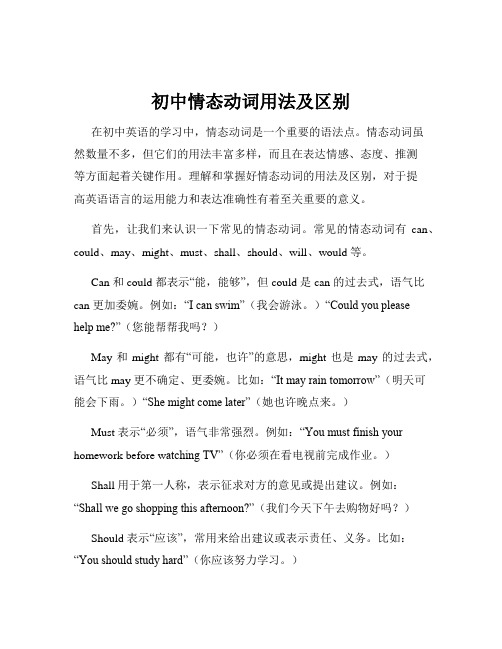
初中情态动词用法及区别在初中英语的学习中,情态动词是一个重要的语法点。
情态动词虽然数量不多,但它们的用法丰富多样,而且在表达情感、态度、推测等方面起着关键作用。
理解和掌握好情态动词的用法及区别,对于提高英语语言的运用能力和表达准确性有着至关重要的意义。
首先,让我们来认识一下常见的情态动词。
常见的情态动词有can、could、may、might、must、shall、should、will、would 等。
Can 和 could 都表示“能,能够”,但 could 是 can 的过去式,语气比can 更加委婉。
例如:“I can swim”(我会游泳。
)“Could you please help me?”(您能帮帮我吗?)May 和might 都有“可能,也许”的意思,might 也是 may 的过去式,语气比 may 更不确定、更委婉。
比如:“It may rain tomorrow”(明天可能会下雨。
)“She might come later”(她也许晚点来。
)Must 表示“必须”,语气非常强烈。
例如:“You must finish your homework before w atching TV”(你必须在看电视前完成作业。
)Shall 用于第一人称,表示征求对方的意见或提出建议。
例如:“Shall we go shopping this afternoon?”(我们今天下午去购物好吗?)Should 表示“应该”,常用来给出建议或表示责任、义务。
比如:“You should study hard”(你应该努力学习。
)Will 和 would 都可以表示“意愿,愿意”,would 是 will 的过去式,语气比 will 更委婉。
例如:“I will help you”(我愿意帮助你。
)“Would you like some coffee?”(你想要来点咖啡吗?)接下来,我们看看情态动词在不同句式中的用法。
初中情态动词用法归纳
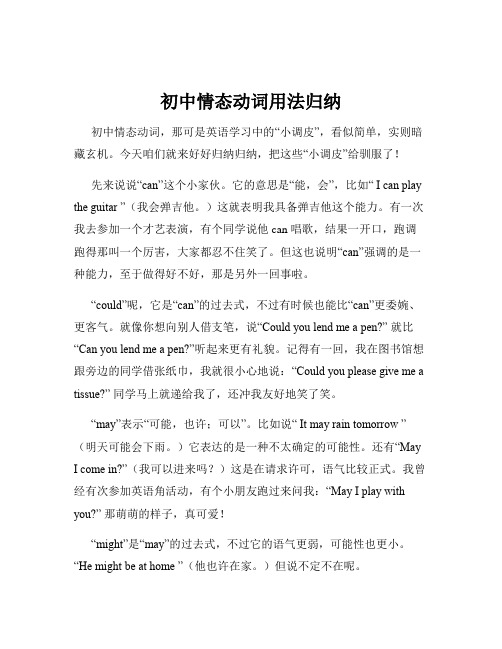
初中情态动词用法归纳初中情态动词,那可是英语学习中的“小调皮”,看似简单,实则暗藏玄机。
今天咱们就来好好归纳归纳,把这些“小调皮”给驯服了!先来说说“can”这个小家伙。
它的意思是“能,会”,比如“ I can play the guitar ”(我会弹吉他。
)这就表明我具备弹吉他这个能力。
有一次我去参加一个才艺表演,有个同学说他 can 唱歌,结果一开口,跑调跑得那叫一个厉害,大家都忍不住笑了。
但这也说明“can”强调的是一种能力,至于做得好不好,那是另外一回事啦。
“could”呢,它是“can”的过去式,不过有时候也能比“can”更委婉、更客气。
就像你想向别人借支笔,说“Could you lend me a pen?” 就比“Can you lend me a pen?”听起来更有礼貌。
记得有一回,我在图书馆想跟旁边的同学借张纸巾,我就很小心地说:“Could you please give me a tissue?” 同学马上就递给我了,还冲我友好地笑了笑。
“may”表示“可能,也许;可以”。
比如说“ It may rain tomorrow ”(明天可能会下雨。
)它表达的是一种不太确定的可能性。
还有“May I come in?”(我可以进来吗?)这是在请求许可,语气比较正式。
我曾经有次参加英语角活动,有个小朋友跑过来问我:“May I play with you?” 那萌萌的样子,真可爱!“might”是“may”的过去式,不过它的语气更弱,可能性也更小。
“He might be at home ”(他也许在家。
)但说不定不在呢。
“must”可就严肃多啦,意思是“必须”,带有很强的命令或者要求的感觉。
像老师说“ You must finish your homework on time ”(你们必须按时完成作业。
)这可没有商量的余地。
我记得有次我没做完作业就想出去玩,被妈妈发现了,她严肃地说:“You must finish your homework first!” 我只好乖乖回去写作业。
七年级英语常见情态动词 及解析
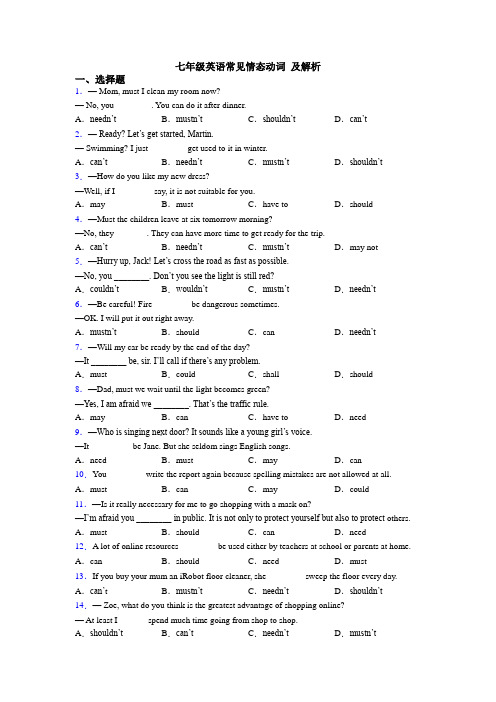
七年级英语常见情态动词及解析一、选择题1.— Mom, must I clean my room now?— No, you ________. You can do it after dinner.A.needn’t B.mustn’t C.shouldn’t D.can’t 2.—Ready? Let’s get started, Martin.— Swimming? I just ________ get used to it in winter.A.can’t B.needn’t C.mustn’t D.shouldn’t 3.—How do you like my new dress?—Well, if I ________ say, it is not suitable for you.A.may B.must C.have to D.should 4.—Must the children leave at six tomorrow morning?—No, they _______. They can have more time to get ready for the trip.A.can’t B.needn’t C.mustn’t D.may not 5.—Hurry up, Jack! Let’s cross the road as fast as possible.—No, you ________. Don’t you see the light is still red?A.couldn’t B.wouldn’t C.mustn’t D.needn’t 6.—Be careful! Fire ________ be dangerous sometimes.—OK. I will put it out right away.A.mustn’t B.should C.can D.needn’t 7.—Will my car be ready by the end of the day?—It ________ be, sir. I’ll call if there’s any problem.A.must B.could C.shall D.should 8.—Dad, must we wait until the light becomes green?—Yes, I am afraid we ________. That’s the traffic rule.A.may B.can C.have to D.need 9.—Who is singing next door? It sounds like a young girl’s voice.—It _________ be Jane. But she seldom sings English songs.A.need B.must C.may D.can10.You ________ write the report again because spelling mistakes are not allowed at all. A.must B.can C.may D.could11.—Is it really necessary for me to go shopping with a mask on?—I’m afraid you ________ in public. It is not only to protect yourself but also to protect others. A.must B.should C.can D.need12.A lot of online resources ________ be used either by teachers at school or parents at home. A.can B.should C.need D.must13.If you buy your mum an iRobot floor cleaner, she ________ sweep the floor every day. A.can’t B.mustn’t C.needn’t D.shouldn’t 14.— Zoe, what do you think is the greatest advantage of shopping online?— At least I ______ spend much time going from shop to shop.A.shouldn’t B.can’t C.needn’t D.mustn’t15.—Have you decided to take up teaching as career after graduation?—I ________ go abroad for further education instead. But it depends.A.must B.should C.may D.shall16.Please don't make so much noise. I ________ hear the speaker very well.A.needn't B.can't C.shouldn't D.mustn't17.The boy is very brave.I ________ he ________ the tall tree.A.dare say; dares to climbB.dare to say; dare climbingC.dare saying; dares climbD.dare to say; dares climbed18.We’ve discussed every detail of this plan and have got everything ready. But still something __________ go wrong. We still have to be very careful.A.must B.should C.would D.may 19.—Would you please________in that way? That’s not safe!—Sorry. I won’t do it any more.A.not driving B.not to drive C.no driving D.not drive20.— Is Lang Lang going to perform at Art Center this Friday?— Yes. It ________ be him. He has been here for three days.A.might B.must C.mustn’t D.may 21.Sometimes smiles ________ be false, hiding other feelings like anger, fear or worry. A.should B.would C.must D.can 22.According to the rule, used batteries ________ be dropped in the red bin for harmful wastes. A.may B.would C.should D.might23.—Will Jim come to Yangzhou for a holiday?—He ________come and it depends on how much homework he will have.A.may B.should C.must D.need24.I think all the students love the weekends because, to them, they ________ get up early on Saturdays or Sundays.A.mustn’t B.don’t need C.needn’t D.can’t25.—Is it usually warm in Yancheng in May?—Yes. But it _______ be rather cold sometimes.A.must B.should C.would D.can26.— Is the boy over there Tom? He often wears a jacket like that.— It _______ be him. He is absent from school today.A.needn’t B.shouldn’t C.mustn’t D.can’t27.You ________ pay too much attention to protecting yourself if you plan to go abroad. A.mustn’t B.can’t C.shouldn’t D.needn’t 28.—Must we stop the Japanese government discharging nuclear waste water (排放核污水) into the Pacific Ocean?—________. Because everyone should protect our earth and it is bad ________ us to eat the polluted seafood and drink the waste water.A.Yes, we can; of B.No, we mustn’t; of C.Yes, we must; for D.No, we needn’t; for 29.Hurry up, or we ________ miss the beginning of the film.A.should B.must C.may D.have to 30.—Excuse me. I haven’t finished reading the boo k yet. May I keep it a bit longer?— Sorry, you ________. You must return it on time.A.needn’t B.can’t C.won’t D.shouldn’t 31.—What is that young lady’s job?—She ________ be a nurse, I’m not sure.A.must B.may C.need D.would32.— The sandstorm in Beijing is so serious this year.— Yes, I wonder when we ________ worry about the air we breathe.A.can’t B.mustn’t C.needn’t D.shouldn’t 33.—Could you tell me how to renew the library books?—With pleasure. You ________ come to our desk every time. It’s easier to renew them online. A.can’t B.mustn’t C.needn’t D.shouldn’t 34.—The article says that a person’s animal sign decides his personality.—You ________ read it for fun, but don’t believe in that.A.can B.must C.shouldn’t D.needn’t35.— What do you think of the show yesterday?— Some of them were really good but others ________ be better.A.will B.must C.need D.can36.—May I have some wine to drink?—No, you ________. You have to drive home later.A.mustn’t B.needn’t C.can’t D.may not 37.You ________ drive after drinking alcohol(酒). It’s against the law.A.mustn’t B.needn’t C.couldn’t D.wouldn’t 38.You ________ be careful with the camera. It costs!A.can B.will C.should D.may39.It’s of great importance to protect the environment. Each of us ________ take an a ctive part in it.A.can B.may C.would D.should40.Look at the floor, Tom! ________ you watch TV while having a meal?A.Should B.Could C.Must D.May【参考答案】一、选择题1.A解析:A【详解】句意:——妈妈,我现在必须打扫房间吗?——不,不需要。
(完整版)七年级情态动词
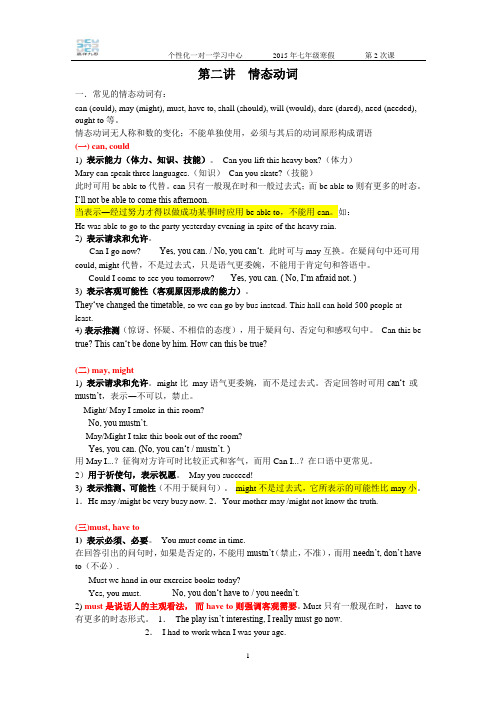
第二讲情态动词一.常见的情态动词有:can (could), may (might), must, have to, shall (should), will (would), dare (dared), need (needed), ought to等。
情态动词无人称和数的变化;不能单独使用,必须与其后的动词原形构成谓语(一) can, could1) 表示能力(体力、知识、技能)。
Can you lift this heavy box?(体力)Mary can speak three languages.(知识)Can you skate?(技能)此时可用be able to代替。
can只有一般现在时和一般过去式;而be able to则有更多的时态。
I‘ll not be able to come this afternoon.当表示―经过努力才得以做成功某事‖时应用be able to,不能用can。
如:He was able to go to the party yesterday evening in spite of the heavy rain.2) 表示请求和允许。
-----Can I go now? ----- Yes, you can. / No, you can‘t. 此时可与may互换。
在疑问句中还可用could, might代替,不是过去式,只是语气更委婉,不能用于肯定句和答语中。
---- Could I come to see you tomorrow? ---- Yes, you can. ( No, I‘m afraid not. )3) 表示客观可能性(客观原因形成的能力)。
They‘ve changed the timetable, so we can go by bus instead. This hall can hold 500 people at least.4)表示推测(惊讶、怀疑、不相信的态度),用于疑问句、否定句和感叹句中。
- 1、下载文档前请自行甄别文档内容的完整性,平台不提供额外的编辑、内容补充、找答案等附加服务。
- 2、"仅部分预览"的文档,不可在线预览部分如存在完整性等问题,可反馈申请退款(可完整预览的文档不适用该条件!)。
- 3、如文档侵犯您的权益,请联系客服反馈,我们会尽快为您处理(人工客服工作时间:9:00-18:30)。
情态动词
【概念引入】
1)情态动词表示说话人对所做动作的观点或态度。
如:需要、可能、意愿、怀疑等。
例如:I must go now. 我现在必须得走了。
2)情态动词一般没有人称和数的变化,但是个别情态动词有时态的变化。
例如:can的过去式是could。
3)情态动词不能单独作谓语,后接动词原形共同做谓语。
例如:I can swim. 我会游泳。
4)常见的情态动词有:can, may, must, have to, should, would等。
5)情态动词一般不止一个意思,它的否定式是在情态动词的后面加not,一般疑问句是将情态动词提到句首。
例如:I can’t speak French. 我不会说法语。
Can you speak English?你会说英语吗?
【用法讲解】
1.can的用法。
1)表能力
We can do our homework by ourselves. 我们可以自己完成作业。
He can swim well. 他游泳很好。
I can play football but I can’t play the piano. 我会踢足球但是我不会弹钢琴。
2)表许可
You can watch TV after supper. 晚饭后你可以看电视。
You can’t play basketball in the street. 你不能在街上打篮球。
3)表请求
Can you help me with my math? 你能帮我学数学吗?
Could you lend your book to me? 你能把你的书借给我吗?
注意:could 是can的过去式,但是这里并不表示过去时,而是表示委婉语气。
拓展:can 和be able to的区别
(1)情态动词can只有两种时态形式,现在式can和过去式could,而be able to有多种时态形式。
在一般过去时中都表示能够时,两者可以互换。
例如:Mary can play the piano. (一般现在时)
玛丽会弹钢琴。
She could / was able to play the piano when she was five. (一般过去时)
她五岁时就会弹琴。
She has been able to play it since she was five. (现在完成时)
她自从五岁起就会弹琴了。
(2)用在过去时中,could经常表示能够做某事,事实上不一定去做,而was ⁄were able to则表示“过去设法做成了某事”。
在否定句中两者可通用。
例如:He could swim across the English Channel. But he didn’t want to do it that day.
他能游过英吉利海峡,但那天他不想游。
Yesterday I was able to get home before the heavy rain.
昨天我在下大雨前赶到了家里。
4)表示“不可能……”
情态动词can的否定式,可以用来表示否定的推测,意为“不可能……”。
例如:That can’t be her father, because her father has gone to England.
那个人不可能是她爸爸,因为她爸爸已经去英国了。
2. may
1)表示请求和允许
例如:May I borrow your bike? 我可以借你的自行车吗?
You may go home now. 现在你可以回家了。
2)表示推测
情态动词may表示推测时,意思是“可能(会),或许(会)”。
例如:It may rain tomorrow. 明天可能会下雨。
She may be at home. 她可能在家呢。
3)may的过去式
may的过去式为might,语气比may弱。
表示推测时,可能性低于may。
例如:He is away from school. He might be sick.
他离开学校了,可能是他生病了。
4)表示希望、祈求、祝愿
may表示希望、祈求、祝愿时,常可译为“祝…,但愿”。
例如:May you have a good time. 祝你过得愉快。
May you be happy! 祝你幸福!
May you succeed! 祝你成功!
3. must
1)表必须
情态动词must在肯定句中后跟动词原形,表示“必须”的含义。
例如:You must finish your homework on time. 你必须按时完成作业。
We must return the books on time. 我们必须按时把书归还。
2)在否定结构中表“禁止,不许”
例如:You mustn't leave here. 不允许你离开这儿。
You mustn’t shout in the classroom. 禁止在教室喊叫。
3)表推测
must用于肯定句中的推测,意为“一定是……”。
例如:He must be ill. He looks so pale.他肯定是病了。
他的脸色那么苍白。
The light is on, so he must be at home now. 灯亮着,他现在肯定在家。
4. have to
have to是一个词组,相当于情态动词,表示“不得不,必须”。
一般现在时中,当主语是第三人称单数时,要将have变成has。
一般过去时中,要将have变成had。
例如:We have to be quiet in the library. 你必须在图书馆保持安静
She has to finish her homework before she goes home.
她在回家前必须完成作业。
拓展:have to 和must的区别
have to表示“必须”时,和must意思相近,有时可以互换。
但是有以下不同:(1)must 侧重于个人意志和主观上的必要。
have to 侧重于客观上的必要。
例如:I know I must study hard. 我知道我必须努力学习。
My brother was very ill, so I had to call the doctor in the mid-night.
我弟弟病得厉害,我只得半夜里把医生请来。
(2)must 和have to的否定式意义区别很大。
m ustn’t表示“不允许和禁止”,但是don’t
have to 表示“不必要”。
例如:You mustn’t park your car here. 不允许在这里停车。
You don’t have to go now. 你没必要现在走。
(3)have to可以用于多种时态,并且有人称和数的变化;而must一般只表示现在或将来,没有人称和数的变化。
例如:I /We/ You/They… must do something.
我(我们/你/你们/他们……)必须得做点什么。
She has to look after her mother today. 她今天必须照看她妈妈。
5. 情态动词的问答
1)由can引起的提问,肯定回答用can,否定回答用can’t。
例如:-Can you open the door? 你能打开门吗?
-Yes, I can. 是的,可以。
-No, I can’t. 不,不可以。
2)由may引起的提问,肯定回答用may/can, 否定回答用can’t/mustn’t。
例如:-May I open the window? 我可以打开窗户吗?
-Yes, you can / may. 是的,可以。
-No,you can’t / mustn’t. 不,不行/不允许。
3)由must引起的提问,肯定回答用must,否定回答用needn’t/ don’t have to。
例如:-Must I finish my homework now? 我现在必须完成作业吗?
-Yes, you must. 是的,必须。
-No, you needn’t / don’t have to. 不,不必。
